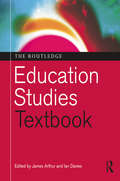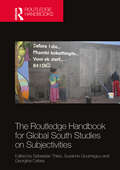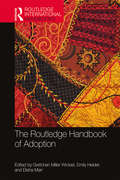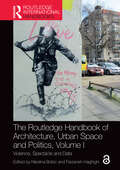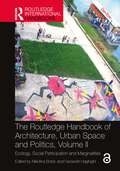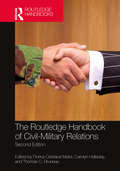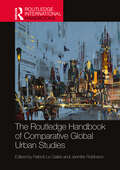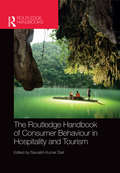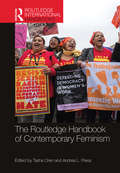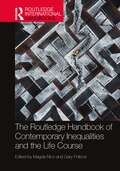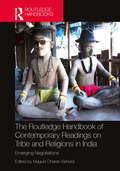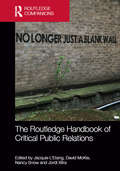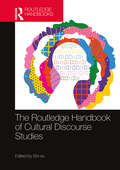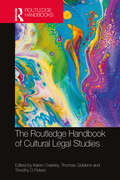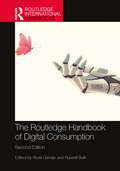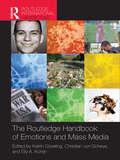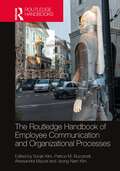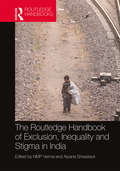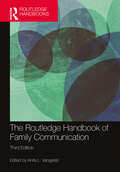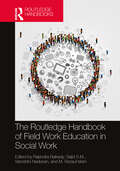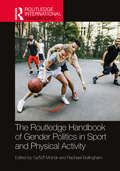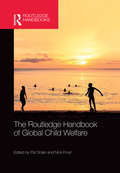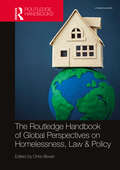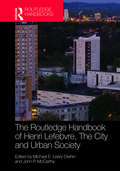- Table View
- List View
The Routledge Education Studies Textbook
by James Arthur and Ian DaviesThe Routledge Education Studies Textbook is an academically wide-ranging and appropriately challenging resource for students beyond the introductory stages of a degree programme in Education Studies. Written in a clear and engaging style, the chapters are divided into three sections that examine fundamental ideas and issues, explore educational contexts, and offer study and research guidance respectively. To support the development of critical thinking, debates between contributors are interspersed within sections and address the following questions: Do private schools legitimise privilege? Should the liberal state support religious schooling? Are developments in post-14 education reducing the divide between the academic and the vocational? Do schools contribute to social and community cohesion? Do traditional and progressive teaching methods exist or are there only effective and ineffective methods? Educational Research: a foundation for teacher professionalism? Each chapter opens with an overview of the rationale behind it and closes with a summary of the main points. At the end of every chapter key questions are posed, encouraging the student to critically reflect on the content, and suggestions for further reading are made. The Routledge Education Studies Textbook is essential reading for students of Education Studies, especially during second and third years of the undergraduate degree. It will be of interest to trainee teachers, including those working towards M Level. A companion volume, The Routledge Education Studies Reader by the same editors, contains key classic and contemporary academic articles and has been designed to be used alongside this Textbook.
The Routledge Handbook for Global South Studies on Subjectivities (Transdisciplinary Souths)
by Sebastian Thies Susanne Goumegou Georgina CebeyThe Routledge Handbook for Global South Studies on Subjectivities provides a series of exemplary studies conjoining perspectives from Asian, African, and Latin American Studies on subjectivity in the Global South as a central category of social and cultural analysis. The contestation of the Northern myth of the autonomous subject—the dispositive that contests subject formation in the South by describing it as fragmented, incomplete, delayed or simply deviant, has been a cornerstone of theory production from the South over the years.This volume’s contributions offer an interdisciplinary and transarea dialogue, reframing issues of selfhood and alterity, of personhood, of the human, of the commons and contesting the North’s presumption in determining what kind of subjectivities abide by its norms, whose voices are heard, who is recognised as a subject, and, by extension, whose lives matter. In the context of the shifting dynamics of today’s manifold crises, they raise questions regarding how subjectivities act on or resist such forms of contestation, contingency, and indeterminacy.A major contribution to the growing body of scholarship on the Global South, this handbook will be an essential resource for students, scholars, researchers and instructors in literature, media and culture studies, sociology, anthropology, philosophy, law, politics, visual arts and art history.
The Routledge Handbook of Adoption (Routledge International Handbooks)
by Gretchen Wrobel Emily Helder Elisha MarrAdoption is practiced globally yielding a multidimensional area of study that cannot be characterized by a single movement or discipline. This handbook provides a central source of contemporary scholarship from a variety of disciplines with an international perspective and uses a multifaceted and interdisciplinary approach to ground adoption practices and activities in scientific research. Perspectives of birth/first parents, adoptive parents, and adopted persons are brought forth through a range of disciplinary and theoretical lenses. Beginning with background and context of adoption, including sociocultural and political contexts, the handbook then addresses the diversity of adoptive families in terms of family forms, attitudes about adoption, and characteristics of adopted children. Next, research examining the lived experience of adoption for birth parents, adoptive parents, and adopted individuals is presented. A variety of outcomes for internationally and domestically adopted children and adoptive families is then discussed and the handbook concludes by addressing the development, training, and implementation of adoption competent clinical practice. With cutting-edge research from top international scholars in a diversity of fields, The Routledge Handbook of Adoption should be considered essential reading for students, researchers, and practitioners across the fields of social work, sociology, psychology, medicine, family science, education, and demography.
The Routledge Handbook of Architecture, Urban Space and Politics, Volume I: Violence, Spectacle and Data (Routledge International Handbooks)
by Nikolina Bobic and Farzaneh HaghighiFor architecture and urban space to have relevance in the 21st Century, we cannot merely reignite the approaches of thought and design that were operative in the last century. This is despite, or because of, the nexus between politics and space often being theorized as a representation or by-product of politics. As a symbol or an effect, the spatial dimension is depoliticized. Consequently, architecture and the urban are halted from fostering any systematic change as they are secondary to the event and therefore incapable of performing any political role. This handbook explores how architecture and urban space can unsettle the unquestioned construct of the spatial politics of governing. Considering both ongoing and unprecedented global problems – from violence and urban warfare, the refugee crisis, borderization, detention camps, terrorist attacks to capitalist urbanization, inequity, social unrest and climate change – this handbook provides a comprehensive and multidisciplinary research focused on the complex nexus of politics, architecture and urban space. Volume I starts by pointing out the need to explore the politics of spatialization to make sense of the operational nature of spatial oppression in contemporary times. The operative and active political reading of space is disseminated through five thematics: Violence and War Machines; Security and Borders; Race, Identity and Ideology; Spectacle and the Screen; and Mapping Landscapes and Big Data. This first volume of the handbook frames cutting-edge contemporary debates and presents studies of actual theories and projects that address spatial politics. This Handbook will be of interest to anyone seeking to meaningfully disrupt the reduction of space to an oppressive or neutral backdrop of political realities.
The Routledge Handbook of Architecture, Urban Space and Politics, Volume I: Violence, Spectacle and Data (Routledge International Handbooks)
by Nikolina Bobic and Farzaneh HaghighiFor architecture and urban space to have relevance in the 21st Century, we cannot merely reignite the approaches of thought and design that were operative in the last century. This is despite, or because of, the nexus between politics and space often being theorized as a representation or by-product of politics. As a symbol or an effect, the spatial dimension is depoliticized. Consequently, architecture and the urban are halted from fostering any systematic change as they are secondary to the event and therefore incapable of performing any political role. This handbook explores how architecture and urban space can unsettle the unquestioned construct of the spatial politics of governing.Considering both ongoing and unprecedented global problems – from violence and urban warfare, the refugee crisis, borderization, detention camps, terrorist attacks to capitalist urbanization, inequity, social unrest and climate change – this handbook provides a comprehensive and multidisciplinary research focused on the complex nexus of politics, architecture and urban space. Volume I starts by pointing out the need to explore the politics of spatialization to make sense of the operational nature of spatial oppression in contemporary times. The operative and active political reading of space is disseminated through five thematics: Violence and War Machines; Security and Borders; Race, Identity and Ideology; Spectacle and the Screen; and Mapping Landscapes and Big Data.This first volume of the handbook frames cutting-edge contemporary debates and presents studies of actual theories and projects that address spatial politics. This Handbook will be of interest to anyone seeking to meaningfully disrupt the reduction of space to an oppressive or neutral backdrop of political realities.Chapters 1 and 23 of this book are freely available as a downloadable Open Access PDF at http://www.taylorfrancis.com under a Creative Commons Attribution (CC-BY) 4.0 license.
The Routledge Handbook of Architecture, Urban Space and Politics, Volume II: Ecology, Social Participation and Marginalities (Routledge International Handbooks)
by Nikolina Bobic Farzaneh HaghighiArchitecture and the urban are connected to challenges around violence, security, race and ideology, spectacle and data. The first volume of this handbook extensively explored these oppressive roles. This second volume illustrates that escaping the corporatized and bureaucratized orders of power, techno-managerial and consumer-oriented capitalist economic models is more urgent and necessary than ever before. Herein lies the political role of architecture and urban space, including the ways through which they can be transformed and alternative political realities constituted. The volume explores the methods and spatial practices required to activate the political dimension and the possibility for alternative practices to operate in the existing oppressive systems while not being swallowed by these structures. Fostering new political consciousness is explored in terms of the following themes: Events and Dissidence; Biopolitics, Ethics and Desire; Climate and Ecology; Urban Commons and Social Participation; Marginalities and Postcolonialism. Volume II embraces engagement across disciplines and offers a wide range of projects and critical analyses across the so-called Global North and South. This multidisciplinary collection of 36 chapters provides the reader with an extensive resource of case studies and ways of thinking for architecture and urban space to become more emancipatory.Chapter 1 of this book is freely available as a downloadable Open Access PDF at http://www.taylorfrancis.com under a Creative Commons Attribution (CC-BY) 4.0 license.
The Routledge Handbook of Civil-Military Relations
by Florina Cristiana MateiThis second edition of The Routledge Handbook of Civil-Military Relations offers a wide-ranging, internationally focused overview of the field of civil-military relations. The armed forces are central actors in most societies and are involved in many different roles. Amongst other activities, they engage in peace operations, support the police in fighting crime, support civilian authorities in dealing with natural disasters, and fight against terrorists and in internal conflicts. The existing literature on this subject is limited in its discussion of warfighting and thus does not do justice to the variety of roles. This second edition not only fills this important lacuna but offers an up-to-date comparative analysis and provides a conceptual framework to analyze how strategies can realistically be implemented. Amalgamating ideas from key thinkers in the field, the book is organized into three main thematic parts: Part I: Civil-Military Relations in Non-Democratic States and Illiberal Democracies; Part II: Civil-Military Relations in New Democracies; Part III: Civil-Military Relations in Established Democracies. This handbook will be essential reading for students and practitioners in the fields of civil-military relations, defense studies, war and conflict studies, international security, and IR in general.
The Routledge Handbook of Comparative Global Urban Studies (Routledge International Handbooks)
by Patrick Le Galès Jennifer RobinsonThe Routledge Handbook of Comparative Global Urban Studies is a timely intervention into the field of global urban studies, coming as comparison is being more widely used as a method for global urban studies, and as a number of methodological experiments and comparative research projects are being brought to fruition. It consolidates and takes forward an emerging field within urban studies and makes a positive and constructive intervention into a lively arena of current debate in urban theory. Comparative urbanism injects a welcome sense of methodological rigor and a commitment to careful evaluation of claims across different contexts, which will enhance current debates in the field. Drawing together more than 50 international scholars and practitioners, this book offers an overview of key ideas and practices in the field and extends current thinking and practice. The book is primarily intended for scholars and graduate students for whom it will provide an invaluable and up-to-date guide to current thinking across the range of disciplines which converge in the study of urbanism, including geography, sociology, political studies, planning, and urban studies.
The Routledge Handbook of Consumer Behaviour in Hospitality and Tourism
by Saurabh Kumar DixitConsumer behaviour is one of the most explored topics in tourism and hospitality marketing, interchangeably denoted by the terms ‘traveller behaviour’, ‘tourist behaviour’ or ‘guest behaviour’. Consumer behaviour acts as an origin for every tourism and hospitality marketing activity. It offers an understanding of why people tend to choose certain products or services and what sort of factors influence them in making their decision. The decision process of buying tourism products or services takes time, because they are mostly intangible in nature due to which there are many risks involved in their buying process. The Routledge Handbook of Consumer Behaviour in Hospitality and Tourism aims to explore and critically examine current debates, critical reflections of contemporary ideas, controversies and pertinent queries relating to the rapidly expanding discipline of consumer behaviour in hospitality and tourism. The Handbook offers a platform for dialogue across disciplinary and national boundaries and areas of study through its diverse coverage. It is divided into six parts: Part I offers an overview of consumer behaviour; Part II focuses on the service quality perspectives of consumer behaviour; Part III deliberates on customer satisfaction and consumer behaviour linkages; Part IV explores the re-patronage behaviour of consumers; Part V addresses the vital issues concerning online consumer behaviour; and Part VI elaborates upon other emerging paradigms of consumer behaviour. Although there is no dearth of empirical studies on different viewpoints of consumer behaviour, there is a scarcity of literature providing conceptual information. The present Handbook is organised to offer a comprehensive theoretical body of knowledge narrating consumer behaviour, especially for hospitality and tourism businesses and operations. It attempts to fill this research gap by offering a 'globalised' volume comprising chapters organised using both practical and academic approaches. This Handbook is essential reading for students, researchers and academics of Hospitality as well as those of Tourism, Marketing, International Business and Consumer Behaviour.
The Routledge Handbook of Contemporary Feminism (Routledge International Handbooks)
by Tasha Oren Andrea PressFeminism as a method, a movement, a critique, and an identity has been the subject of debates, contestations and revisions in recent years, yet contemporary global developments and political upheavals have again refocused feminism’s collective force. What is feminism now? How do scholars and activists employ contemporary feminism? What feminist traditions endure? Which are no longer relevant in addressing contemporary global conditions? In this interdisciplinary collection, scholars reflect on how contemporary feminism has shaped their thinking and their field as they interrogate its uses, limits, and reinventions. Organized as a set of questions over definition, everyday life, critical intervention, and political activism, the Handbook takes on a broad set of issues and points of view to consider what feminism is today and what current forces shape its future development. It also includes an extended conversation among major feminist thinkers about the future of feminist scholarship and activism. The scholars gathered here address a wide variety of topics and contexts: activism from post-Soviet collectives to the Arab spring, to the #MeToo movement, sexual harassment, feminist art, film and digital culture, education, technology, policy, sexual practices and gender identity. Indispensable for scholars undergraduate and postgraduate students in women, gender, and sexuality, the collection offers a multidimensional picture of the diversity and utility of feminist thought in an age of multiple uncertainties.
The Routledge Handbook of Contemporary Inequalities and the Life Course (Routledge International Handbooks)
by Magda NicoDrawing upon perspectives from across the globe and employing an interdisciplinary life course approach, this handbook explores the production and reproduction of different types of inequality across a variety of social contexts. Inequalities are not static, easily measurable, and essentially quantifiable circumstances of life. They are processes which impact on individuals throughout the life course, interacting with each other, accumulating, attenuating, reproducing, or distorting themselves along the way. The chapters in this handbook examine various types of inequality, such as economic, gender, racial, and ethnic inequalities, and analyse how these inequalities manifest themselves within different aspects of society, including health, education, and the family, at multiple levels and dimensions. The handbook also tackles the global COVID-19 pandemic and its striking impact on the production and intensification of inequalities. The interdisciplinary life course approach utilised in this handbook combines quantitative and qualitative methods to bridge the gap between theory and practice and offer strategies and principles for identifying and tackling issues of inequality. This book will be indispensable for students and researchers as well as activists and policy makers interested in understanding and eradicating the processes of production, reproduction, and perpetuation of inequalities.
The Routledge Handbook of Contemporary Readings on Tribe and Religions in India: Emerging Negotiations
by Maguni Charan BeheraTribal societies in India observe a diverse set of religious practices which are a quintessential part of their community life. This handbook explores rituals, beliefs, ceremonies and festivals, liturgy, knowledge and traditions that tribal people practice today and traces the history of their interaction with other religions, communities and cultures.The book provides analytical, intellectual, and cultural insights into the religious tradition of tribes within the interactive space of a pan-Indian civilisation. It examines contemporary religious practice within tribes while also exploring changes either brought on by interactions or political interventions. The volume reflects on the intersections of cultural or political life of communities and their religious worldviews. The book also discusses the processes of assimilation or adoption of different religion or religious traditions by tribes and the challenges of detribalisation and shrinking populations of vulnerable groups. It explores both established and emerging dynamics in the field of tribe and religion and provides a look into the unique systems of kinship, worship and life within many different tribal communities in India.This and its companion handbook, The Routledge Handbook of Tribe and Religions in India: Contemporary Readings on Spirituality, Belief and Identity, provide a comprehensive look into the religious life and practices of a very diverse group of tribes in India. It will be of interest to academics and researchers working in the fields of religion, anthropology, indigenous and tribal studies, social and cultural anthropology, sociology of culture, sociology of religion, development studies, history, political science, folkloristic, and colonialism.
The Routledge Handbook of Critical Public Relations (Routledge Companions in Business, Management and Accounting)
by Nancy Snow Jacquie L'Etang David McKie Jordi XifraCritical theory has a long history, but a relatively recent intersection with public relations. This ground-breaking collection engages with commonalities and differences in the traditions, whilst encouraging plural perspectives in the contemporary public relations field. Compiled by a high-profile and widely respected team of academics and bringing together other key scholars from this field and beyond, this unique international collection marks a major stage in the evolution of critical public relations. It will increasingly influence how critical theory informs public relations and communication. The collection takes stock of the emergence of critical public relations alongside diverse theoretical traditions, critiques and actions, methodologies and future implications. This makes it an essential reference for public relations researchers, educators and students around a world that is becoming more critical in the face of growing inequality and environmental challenges. The volume is also of interest to scholars in advertising, branding, communication, consumer studies, cultural studies, marketing, media studies, political communication and sociology.
The Routledge Handbook of Cultural Discourse Studies (Routledge Handbooks in Linguistics)
by Shi-XuIn response to the cultural challenges in society and scholarship, this handbook presents the conceptions, assumptions, principles, methods, topics and issues in the studies of cultural forms of human communication—cultural discourses—by experts from around the world.A culturalist programme in communication studies (CS), cultural discourse studies (CDS), as represented in this handbook, is a new current of thought in human and social science and a form of academic activism, but above all, it is a fresh paradigm of research committed to enhancing cultural harmony and prosperity on the one hand and facilitating intellectual plurality and innovation on the other hand. This handbook is the first of its kind; it is concerned with the identities of, and interactions between, the world’s diverse cultural communities through locally-grounded and globally-minded, culturally conscious and critical approaches to their communicative practice. Contributors apply such insights, precepts and techniques, not merely to discover and describe past and present communication, but also to design and guide future communication.This handbook is ideal for scholars and students interested in cultural aspects and issues of communication/discourse, as well as researchers of other fields looking to apply cultural discourse methods to their own projects.
The Routledge Handbook of Cultural Legal Studies
by Thomas Giddens Karen Crawley Timothy D PetersThis handbook provides a comprehensive introduction to the cutting-edge field of cultural legal studies.Cultural legal studies is at the forefront of the legal discipline, questioning not only doctrine or social context, but how the concerns of legality are distributed and encountered through a range of material forms. Growing out of the interdisciplinary turn in critical legal studies and jurisprudence that took place in the latter quarter of the 20th century, cultural legal studies exists at the intersection of a range of traditional disciplinary areas: legal studies, cultural studies, literary studies, jurisprudence, media studies, critical theory, history, and philosophy. It is an area of study that is characterised by an expanded or open-ended conception of what ‘counts’ as a legal source, and that is concerned with questions of authority, legitimacy, and interpretation across a wide range of cultural artefacts. Including a mixture of established and new authors in the area, this handbook brings together a complex set of perspectives that are representative of the current field, but which also address its methods, assumptions, limitations, and possible futures.Establishing the significance of the cultural for understanding law, as well as its importance as a potential site for justice, community, and sociality in the world today, this handbook is a key reference point both for those working in the cultural legal context – in legal theory, law and literature, law and film/television, law and aesthetics, cultural studies, and the humanities generally – as well as others interested in the interactions between authority, culture, and meaning.
The Routledge Handbook of Digital Consumption (Routledge International Handbooks)
by Rosa Llamas Russell BelkSince the publication of the ground-breaking first edition, there has been an exponential growth in research and literature about the digital world and its enormous potential benefits and threats. Fully revised and updated, this new edition brings together an expertly curated and authoritative overview of the impact and emerging horizons of digital consumption. Divided into sections, it addresses key topics including digital entertainment, self-representation, communication, Big Data, digital spirituality, online surveillance, and algorithmic advertising. It explores developments such as consumer data collection techniques, peer-to-peer payment systems, augmented reality, and AI-enhanced consumer well-being, as well as digital transgression, secrecy, crypto-currencies, NFTs, and cultural concerns such as the spread of conspiracy theories and fake news. From digital influencers, digital nomads, and digital neo-tribalism to robots and cyborgs, it explores existences that blur boundaries between humans and machines, reality and the metaverse, and the emerging "technoculture" – a state of all-encompassing digital being. This unique volume is an essential resource for scholars, practitioners, and policy makers, and will continue to provide a new generation of readers with a deep understanding of the universe of digital consumption.
The Routledge Handbook of Emotions and Mass Media
by Katrin DövelingThe impact of mass media on individuals and society is to a great extent based on human emotions. Emotions, in turn, are essential in understanding how media messages are processed as well as media’s impact on individual and social behavior and public social life. Adopting an interdisciplinary approach to the study of emotions within a mass media context, the Handbook of Emotions and Mass Media addresses areas such as evolutionary psychology, media entertainment, sociology, cultural studies, media psychology, political communication, persuasion, and new technology. Leading experts from across the globe explore cutting-edge research on issues including the evolutionary functions of mediated emotions, emotions and media entertainment , measurements of emotions within the context of mass media, media violence, fear-evoking media, politics and public emotions, features , forms and functions of emotions beyond the message, and provide the reader a glimpse into future generations of media technology. This compelling and authoritative Handbook is an essential reference tool for scholars and students of media, communication studies, media psychology, emotions, cultural studies, sociology, and other related disciplines.
The Routledge Handbook of Employee Communication and Organizational Processes (Routledge Studies in Communication, Organization, and Organizing)
by Patrice M. Buzzanell Jeong-Nam Kim Soojin Kim Alessandra MazzeiThis Routledge Handbook takes a truly global and multidisciplinary approach to exploring all facets of employee communication.Beginning with two key disciplinary approaches—organizational communication and public relations—scholars capture and define employee communication from both perspectives, addressing commonalities and bridging disciplinary differences. This volume places importance on the everyday communicative behaviors by internal members such as leaders, managers, inter/generational cohorts, employees, and those working on behalf of organizations, such as social media influencers, and on expansive conceptualizations of employee communication such as chatbots, environment, and global supply chain members involved in organizing. With a focus on employees in situ, the authors respond to these key questions: in what ways is employee communication relevant today? What does employee communication entail? How, why, and to what extent does employee communication influence or become influenced by organizational processes?Investigating antecedents, organizational contexts and processes, and consequences of employee communication, and offering key theoretical information and empirically driven recommendations for practice, this handbook will be an essential resource for students, researchers, and industry practitioners in employee communication, organizational communication, business and management, leadership communication, and public relations more generally.
The Routledge Handbook of Exclusion, Inequality and Stigma in India
by N. M. P. Verma Alpana SrivastavaThis handbook critically examines the three concepts of exclusion, inequality and stigma and their interrelationship in the Indian context. Divided into five parts, the volume deals with the issues of exclusion, inequality, gender discrimination, health and disability, and assault and violence. It discusses important topical themes such as caste and social exclusion in rural labour markets, impact of poverty and unemployment, discrimination in education and literacy, income inequality and financial inclusion, social security of street vendors, women social entrepreneurs, rural–urban digital divide, workplace inequality, women trafficking, acid attacks, inter-caste marriages, honour killings, health care and sanitation, discrimination faced by those with disabilities, and regional disparities in India. The book traces rising socio-economic inequality and discrimination along with the severe lack of access to resources and opportunities, redressal instruments, legal provisions and implementation challenges, while also looking at deep-rooted causes responsible for their persistence in society. With emphasis on affirmative action, systemic mechanisms, and the role of state and citizens in bridging gaps, the volume presents several policies and strategies for development. It combines wide-ranging empirical case studies backed by relevant theoretical frameworks to map out a new agenda for research on socio-economic inequality in India with important implications for public policy. Comprehensive and first of its kind, this handbook will serve as a key reference to scholars, researchers and teachers of exclusion and discrimination studies, social justice, political economy, sociology, anthropology, economics, political science, development studies, education and public administration. It will also be useful to policymakers, bureaucrats, civil society activists, non-governmental organisations and social entrepreneurs in the development sector, in addition to those interested in third world studies, developing economies and the global south.
The Routledge Handbook of Family Communication (ISSN)
by Anita L. VangelistiThis third edition again brings together interdisciplinary contributions to provide a comprehensive and multifaceted resource that reflects the breadth and depth of research on family communication and family relationships.Chapters continue to address theoretical and methodological issues influencing current conceptions of family and cover communication occurring in a variety of family forms and across social, cultural, and physical contexts.This third edition includes key updates, such as: The use and influence of social media and technology in families Parenting and communication in culturally and structurally diverse families Communication and physical health of family members Managing personal information about difficult topics in families The influence of the COVID-19 pandemic on family members This handbook is ideal for students and researchers interested in interpersonal and family communication, relationships, and family therapy within the disciplines of communication, social psychology, clinical psychology, sociology, and family studies.
The Routledge Handbook of Field Work Education in Social Work
by Rajendra Baikady, Sajid S.M., Varoshini Nadesan, and M. Rezaul IslamThis Handbook provides an authoritative account of international fieldwork education in social work. It presents an overview of advances in research in social work field education through in-depth analyses and global case studies. Key features: * Discusses critical issues in teaching social work and curriculum development; health care social work; stimulated learning; field education policies; needs, challenges, and solutions in fieldwork education; reflexivity training; creativity and partnership; resilience enhancement; integrated and holistic education for social workers; student experience; practice education; and ethical responsibility of social work field instructors. * Covers social work field education across geographical regions (Asia and the Pacific; North and South America; Australia and Oceania; Europe) and major themes and trends from several countries (U.S.A.; Canada; Australia; China; Hong Kong; Sweden; Aotearoa New Zealand; England; Ukraine; Spain; Estonia; Italy; Ireland; Slovenia; Poland; Romania; Greece; Norway; Turkey; and the Czech Republic). * Brings together international comparative perspectives on fieldwork education in social work from leading experts and social work educators. This Handbook will be an essential resource for scholars and researchers of social work, development studies, social anthropology, sociology, and education. It will also be useful to educators and practitioners of social work in global institutions of higher studies as well as civil society organisations.
The Routledge Handbook of Gender Politics in Sport and Physical Activity (Routledge International Handbooks)
by Győző MolnárThis progressive and broad-ranging handbook offers a comprehensive overview of the complex intersections between politics, gender, sport and physical activity, shining new light on the significance of gender, sport and physical activity in wider society. Featuring contributions from leading and emerging researchers from around the world, the book makes the case that gender studies and critical thinking around gender are of particular importance in an era of increasingly intolerant populist politics. It examines important long-term as well as emerging themes, such as recent generational shifts in attitudes to gender identity in sport and the socio-cultural expectations on men and women that have traditionally influenced and often disrupted their engagement with sport and physical activity, and explores a wide range of current issues in contemporary sport, from debates around the contested gender binary and sex verification, to the role of the media and social media, and the significance of gender in sport leadership, policy and decision-making. This book is an authoritative survey of the current state of play in research connecting gender, sport, physical activity and politics, and is an important contribution to both sport studies and gender studies. It is fascinating reading for any student, researcher, policy-maker or professional with an interest in sport, physical activity, social studies, public health or political science.
The Routledge Handbook of Global Child Welfare (Routledge International Handbooks)
by Nick Frost Pat DolanIn the context of the increasing global movement of people and a growing evidence base for differing outcomes in child welfare, Routledge Handbook of Global Child Welfare provides a compelling account of child welfare, grounded in the latest theory, policy and practice. Drawing on eminent international expertise, the book offers a coherent and comprehensive overview of the policies, systems and practices that can deliver the best outcomes for children. It considers the challenges faced by children globally, and the difference families, services and professionals can make. This ambitious and far-reaching handbook is essential reading for everyone working to make the world a better and safer place for children.
The Routledge Handbook of Global Perspectives on Homelessness, Law & Policy
by Chris BevanThis handbook provides a comprehensive global survey and assessment of the law and policy relating to homelessness prevention. Homelessness is regarded internationally as one of the most pressing issues facing humanity and one of the greatest social challenges of our times. This has been further amplified as a result of the Covid-19 pandemic. Across the globe, there is an enormous divergence in both experiences of and responses to homelessness from governments and state actors. This handbook examines how different jurisdictions from across all five continents of the world have encountered, framed and responded to homelessness. Written by expert scholars and leaders in their field, the book engages in a multidisciplinary and comparative analysis of homelessness as an issue of acute social concern. Understandings of homelessness are geographically, culturally and historically situated, making analysis of each jurisdiction’s approach by a national expert deeply insightful. The collection examines legal and extra-legal policy interventions targeted at reducing or preventing homelessness from across the globe. Drawing on diverse perspectives, differing cultures and welfare regimes, it thus constitutes a timely evaluation of current approaches to homelessness internationally. This book will appeal to students and scholars of homelessness, sociology, social policy, anthropology, and urban sociology, as well as international and national policymakers.
The Routledge Handbook of Henri Lefebvre, The City and Urban Society
by Michael E. Leary-Owhin John P. McCarthyThe Routledge Handbook of Henri Lefebvre,The City and Urban Society is the first edited book to focus on Lefebvre's urban theories and ideas from a global perspective, making use of recent theoretical and empirical developments, with contributions from eminent as well as emergent global scholars. The book provides international comparison of Lefebvrian research and theoretical conjecture and aims; to engage with and critique Lefebvre's ideas in the context of contemporary urban, social and environmental upheavals; to use Lefebvre's spatial triad as a research tool as well as a point of departure for the adoption of ideas such as differential space; to reassess Lefebvre's ideas in relation to nature and global environmental sustainability; and to highlight how a Lefebvrian approach might assist in mobilising resistance to the excesses of globalised neoliberal urbanism. The volume draws inspiration from Lefebvre's key texts (The Production of Space; Critique of Everyday Life; and The Urban Revolution) and includes a comprehensive introduction and concluding chapter by the editors. The conclusions highlight implications in relation to increasing spatial inequalities; increasing diversity of needs including those of migrants; more authoritarian approaches; and asymmetries of access to urban space. Above all, the book illustrates the continuing relevance of Levebvre's ideas for contemporary urban issues and shows – via global case studies – how resistance to spatial domination by powerful interests might be achieved. The Handbook helps the reader navigate the complex terrain of spatial research inspired by Lefebvre. In particular the Handbook focuses on: the series of struggles globally for the 'right to the city' and the collision of debates around the urban age, 'cityism' and planetary urbanisation. It will be a guide for graduate and advanced undergraduate teaching, and a key reference for academics in the fields of Human Geography, Sociology, Political Science, Applied Philosophy, Planning, Urban Theory and Urban Studies. Practitioners and activists in the field will also find the book of relevance.
